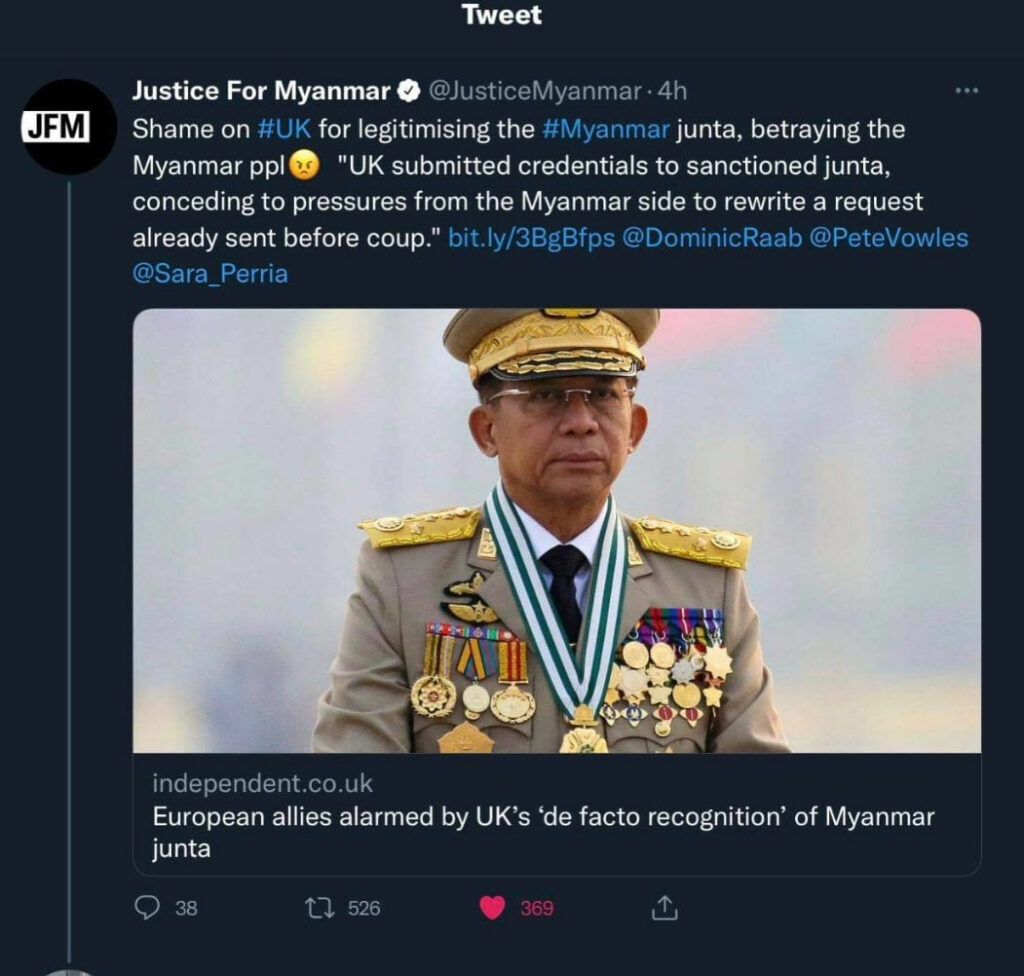US and UK Usurp Rohingya Voices while (Miss)Framing Myanmar Genocide as “Ethnic Cleansing,” Slobodan Milošević’s Euphemism
TRANSCEND MEMBERS, 30 Aug 2021
Maung Zarni | FORSEA – TRANSCEND Media Service
It’s one thing for the United States and its British poodle to abandon dissidents worldwide during their hours of needs, yet it is a moral low for the British and American officials and leaders to coordinate acts of genocidal denial as they have done with their official statements on the 4th anniversary of “Ethnic Cleansing” in Rakhine State.
28 Aug 2021 – I was shocked and deeply repulsed, beyond words, to witness the apparent, coordinated attempts by the administrations of Boris John and Joe Biden at bleaching Myanmar’s international legal crime of genocide – no less – on the very day Rohingya survivors around the world have come to recognize as Genocide Remembrance Day.
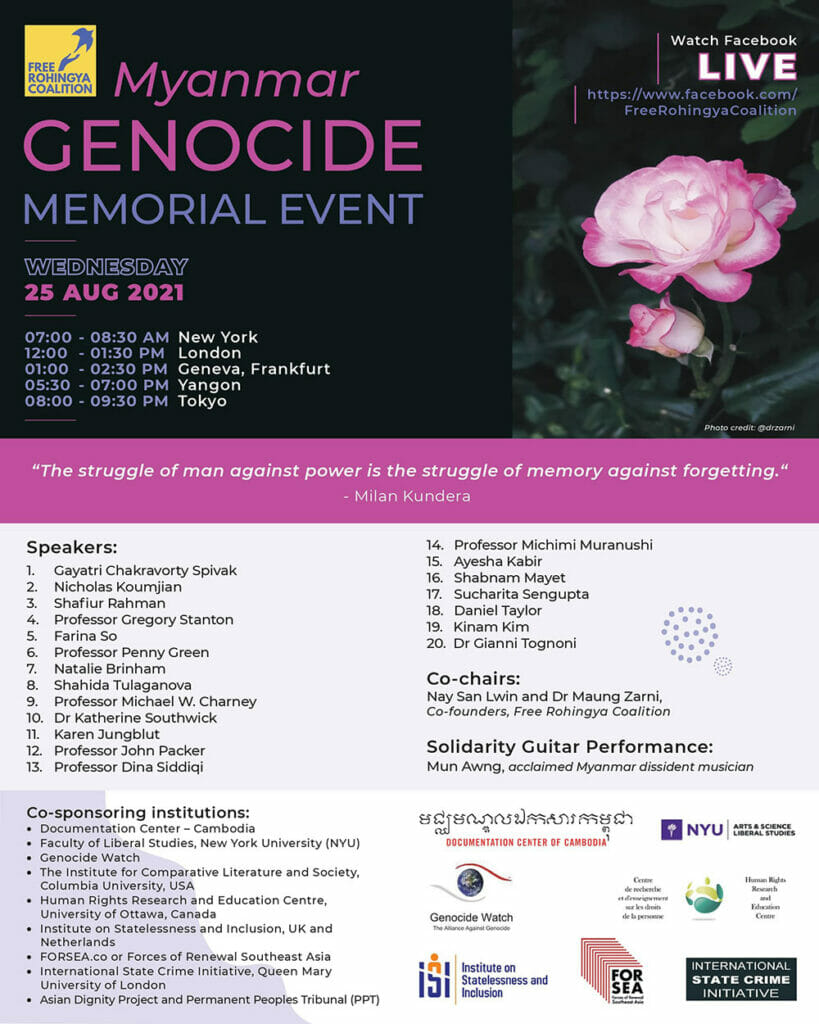
Event to mark Genocide Remembrance Day
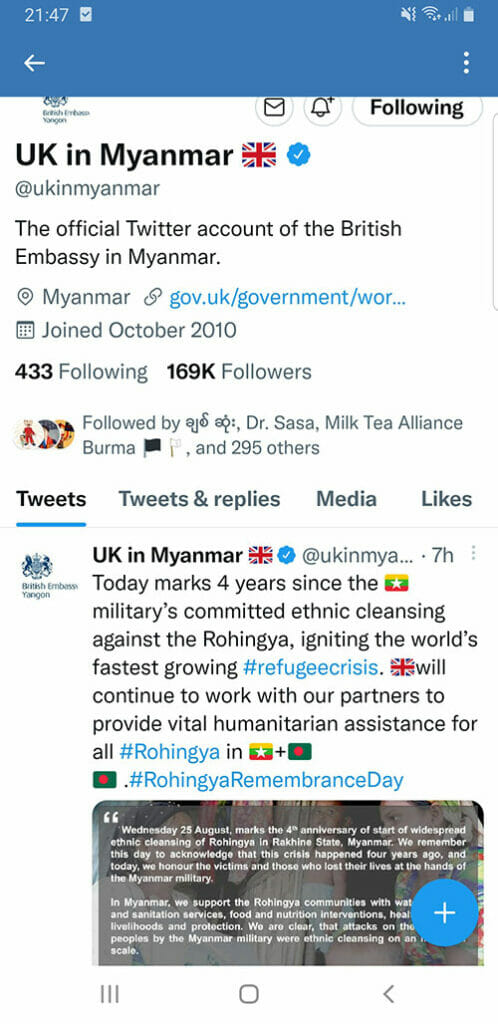 While the British Embassy @UK-in-Myanmar was busy tweeting “Today marks the 4th anniversary since the military’s committed ethnic cleansing against the Rohingya ….” the US State Department issued a press statement, entitled “Marking the 4th Anniversary of Ethnic Cleansing in Rakhine State”. The American version of spin begins with the opening sentence, “(f)our years ago, Burma’s military launched a horrific ethnic cleansing against Rohingya in northern Rakhine State.”
While the British Embassy @UK-in-Myanmar was busy tweeting “Today marks the 4th anniversary since the military’s committed ethnic cleansing against the Rohingya ….” the US State Department issued a press statement, entitled “Marking the 4th Anniversary of Ethnic Cleansing in Rakhine State”. The American version of spin begins with the opening sentence, “(f)our years ago, Burma’s military launched a horrific ethnic cleansing against Rohingya in northern Rakhine State.”
In a different moral universe where rights activists such as myself and two-dozen scholars and activists firmly anchor ourselves, human rights are lived principles and international crime codes such as the Genocide Convention are lived principles.
To belabour the obvious, the West’s liberal democratic regimes – in this case, the Anglo-American governments – manipulate the principles of human rights and inter-state treaties such as the Convention on the Prevention and Punishment of the Crime of Genocide in order to suit their undeclared geopolitical and corporate interests.
For the Americans, Myanmar genocide is viewed through its prism of paranoia about Beijing dislodging USA as the global hegemon.
The post-Brexit Britain is chiefly concerned about maintaining its market access and shoring up corporate profits in emerging markets, however heinous their business partners may be.
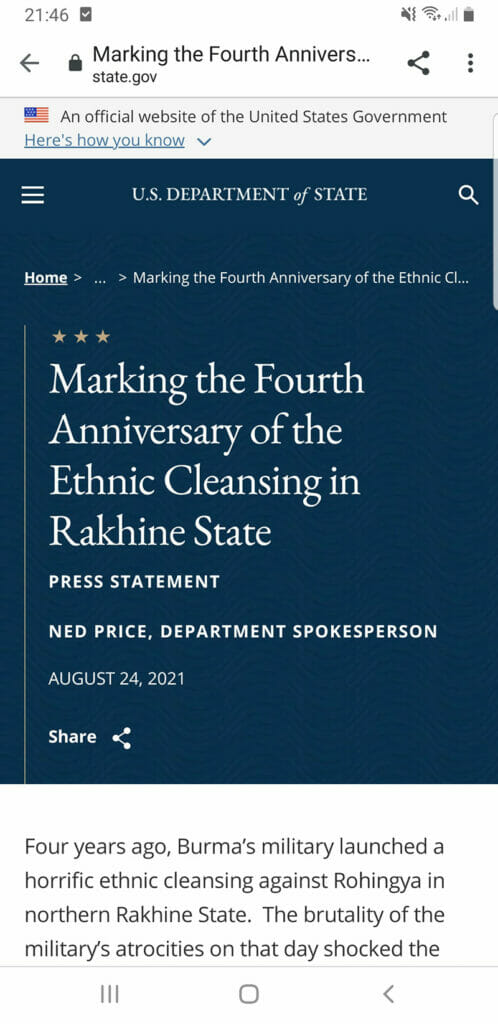 But even my 30-years of international human rights activism, at times in corridors of power, did not prepare me for the level of usurpation and moral depravity that the American and British policy-makers are prepared to sink. Washington and London in effect deny and dismiss the crime of genocide on the day Rohingya mourned their mass-deads and destruction while throwing humanitarian crumbs at the survivor community in sub-human conditions in Bangladesh and Myanmar.
But even my 30-years of international human rights activism, at times in corridors of power, did not prepare me for the level of usurpation and moral depravity that the American and British policy-makers are prepared to sink. Washington and London in effect deny and dismiss the crime of genocide on the day Rohingya mourned their mass-deads and destruction while throwing humanitarian crumbs at the survivor community in sub-human conditions in Bangladesh and Myanmar.
By mis-naming and mis-framing the genocide as “ethnic cleansing”, alas, that favourite euphemism by the now dead Serbian genocidal leader Slobodan Milošević, Johnson and Biden regimes have added insult to the collective injury of several million Rohingya survivors, in refugee and IDP camps, in the diaspora and in boats fleeing from secondary persecution at the hands of the hostile host governments of Bangladesh, India and so on.
It is expected that unprincipled US leaders, democrats and republicans, would routinely attempt to use the morally loaded term “genocide,” both Lemkinian conception and the inter-state treaty Genocide Convention, to score cheap points against other rogue regimes such as China, Libya, or Syria. But it is yet another low for Washington and London to coordinate their Milosevicesque statements, in effect, dismissing Rohingya demand for calling a spade a spade.
The Biden Administration’s politically motivated refusal to officially acknowledge the institutionalized physical destruction of Rohingyas, declared a protected group under the Genocide Convention by the International Court of Justice, stands in sharp contrast with the overwhelming recognition and condemnations of Myanmar’s crime of genocide by US Congress. The two leading lawmakers, who chair US Senate Foreign Relations Committee and (lower) House of Representatives Foreign Affairs Committee publicly pressed US President Joe Biden “to make a formal determination that these crimes (against Rohingya) constitute genocide.”
Meanwhile, Gregory Stanton, former State Department official and the world’s foremost legal and anthropological scholar of genocide – trained at Yale Law and the University of Chicago – was reading his poetry “What is justice?”, at the Free Rohingya Coalition Genocide Memorial Event on 25 August, having asked pointedly, “What is justice for a lawyer who still won’t call it genocide?”. https://fb.watch/7EiCy1kB-h/
In his forthcoming publication, entitled “‘thnic Cleansing’ is a Euphemism Used for Genocide Denial”, Stanton argues persuasively that the use of Milosevic’s euphemism “ethnic cleansing” is tantamount to genocide denial.

Rohingyas at the Kutupalong refugee camp in Bangladesh, October 2017. Wikipedia Commons
In Stanton’s scathing words of indictment: “The UN, press, human rights groups, and many governments still call the Myanmar Army’s aggression, genocidal massacres, and forced deportation against the Rohingya “ethnic cleansing.” “Ethnic cleansing” is a term invented by Slobodan Milošević and Serbian propagandists as a euphemism for forced deportation and genocide. “Ethnic cleansing” in common usage means forced deportation. But unlike the crime against humanity of deportation or forcible transfer of population, and the crime of genocide, it is not a term that appears in the Rome Statute of the International Criminal Court. It has no legal meaning in international law. There is no treaty outlawing it. No national legal codes prohibit “ethnic cleansing.” No prosecutor can charge anyone for committing it. The term is a license for impunity.
As used by Milošević, the press, the U.N., and many governmental policy makers, the term “ethnic cleansing” is used to avoid using the word “genocide.” “Ethnic cleansing” has become a euphemism used for genocide denial. Because Article 1 of the Genocide Convention implies the obligation to act to prevent genocide, avoiding use of the term “genocide” has the same practical outcome as genocide denial. Users of the term “ethnic cleansing” – like genocide deniers – are freed from their duty to prevent or stop genocide.”
On the same FRC Genocide Memorial Event, Dr Katherine Southwick, another Yale-trained American legal scholar who warned of genocide against the Rohingya as early as 2014, vented her frustration. Southwick said to the Facebook LIVE audience of 20,000+ viewers yesterday, “so with frustration with the international community’s own lack of accountability, yet with hope and gratitude, the international community must do nothing less than acknowledge genocide and renew our solidarity and support for the Rohingya and equal rights for all in Myanmar.”
Taking a non-legal perspective, Gayatri Chakravorty Spivak, the leading scholar of post-colonial studies and University Professor in the Humanities at Columbia University in New York, was emphatic with her demand for legal acknowledgment of genocide – which Rohingya have long been subjected to – when she invoked “common sense”.
The Indian scholar told the worldwide audience at the FRC Genocide Memorial Facebook LIVE yesterday thus: “I want to speak to my Rohingya brothers and sisters and talk to them about a possible future. It is the unacknowledged genocide that has made it impossible for me to do what I want to do today. I don’t think our conscience needs to go to legal definitions to acknowledge that the Rohingya is killed simply because she is a Rohingya. By common sense, that is genocide. But we must have an international legal acknowledgment in order for the possibility of legal redress to begin.”
While Rohingya – and their international friends – worldwide mourned the mass-death and destruction of numerous victims raped, maimed, slaughtered, and otherwise genocidally purged – and lamented the absence of any effective acts by the “abstract international community” – to borrow Spivak’s coinage – General Sadat, a US-trained commander in the Afghan National Army, was writing in the New York Times, with (justified) anger towards the United States government for having abandoned Afghan people.
The general writes, “I am exhausted. I am frustrated. And I am angry.
President Biden said last week that “American troops cannot and should not be fighting in a war and dying in a war that Afghan forces are not willing to fight for themselves.
It’s true that the Afghan Army lost its will to fight. But that’s because of the growing sense of abandonment by our American partners and the disrespect and disloyalty reflected in Mr. Biden’s tone and words over the past few months.”
The betrayal and a palpable sense of abandonment that the wretched of the earth who struggle for their right to life and liberty, have felt towards the liberal West in general and the United States in particular, with the latter’s signature honey-tongued support for human rights and “the rule-based international order” is nothing new.
In the early years of the Cold War, after having made promises of solidarity which they never intended to keep, the United States (and western allies) abandoned thousands of Hungarian rights activists in the wintery month of November 1956.
Almost 20 years ago, Matthew Daley, the then serving as the Deputy Assistant Secretary of State in the Bureau of East Asian Affairs at the United States State Department, pointedly warned me against trusting and relying on his employer for the Burmese liberation struggle, in our one-on-one meeting in his office at Foggy Bottom in Washington, DC:
“My government’s Burma policy is unconscionable. We made empty promises to the Hungarian democrats in 1956. Then when they were slaughtered (by the Soviets), we did nothing. So, you Burmese must find your own solutions.”
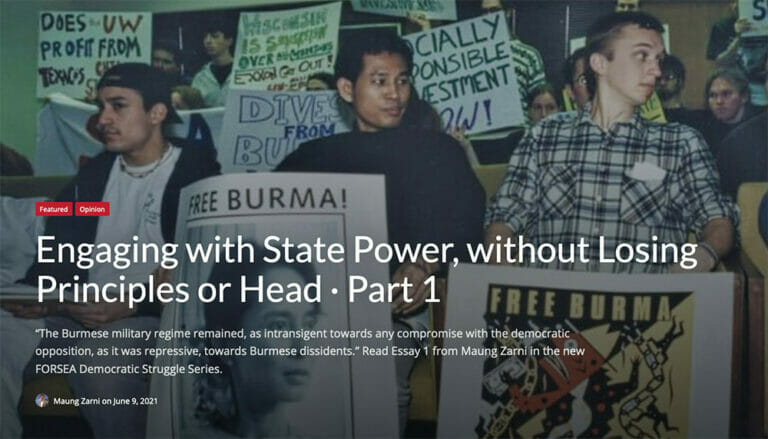 But it’s one thing for the United States and its British poodle across this side of the Atlantic to abandon dissidents worldwide against dodgy regimes during the latter’s hours of needs, be they Hungarians, South Vietnamese or, presently, pro-human rights and anti-Taliban Afghan peoples. It is altogether another moral low for the British and American officials and leaders to coordinate acts of genocidal denial as they have done with their official statements on the 4th anniversary of “Ethnic Cleansing” in Rakhine State.
But it’s one thing for the United States and its British poodle across this side of the Atlantic to abandon dissidents worldwide against dodgy regimes during the latter’s hours of needs, be they Hungarians, South Vietnamese or, presently, pro-human rights and anti-Taliban Afghan peoples. It is altogether another moral low for the British and American officials and leaders to coordinate acts of genocidal denial as they have done with their official statements on the 4th anniversary of “Ethnic Cleansing” in Rakhine State.
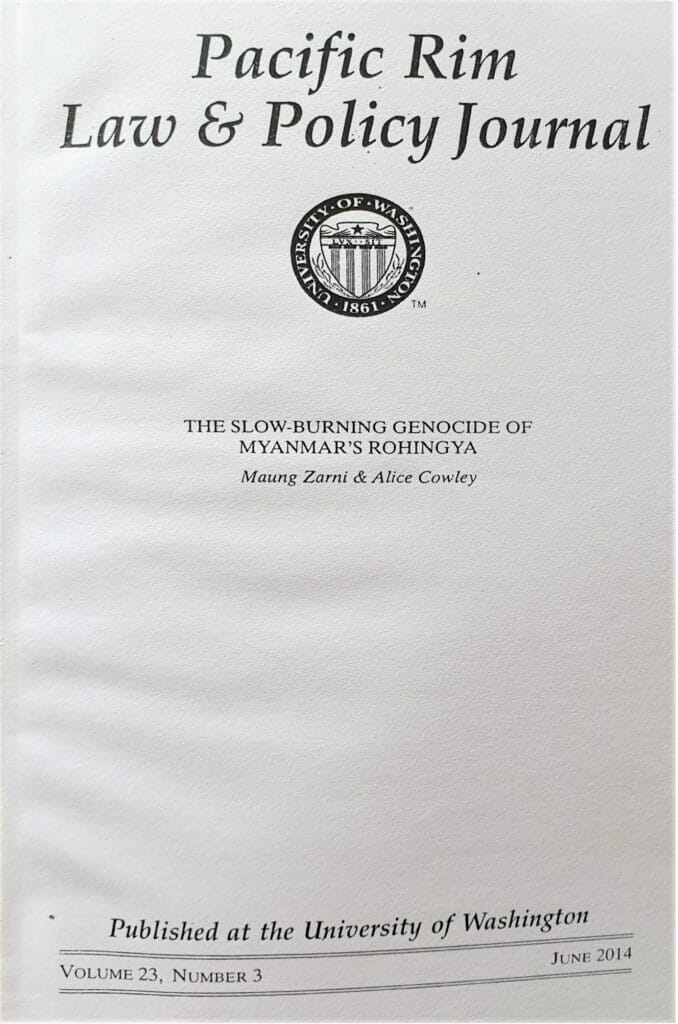 Ten years ago, my own research colleague and wife Natalie Brinham (pseudonym Alice Cowley) and I conducted a 3-year pathbreaking study based on Rohingya survivors in Malaysia, India, Bangladesh, Saudi Arabia and Myanmar, and we reached unequivocal conclusion that Myanmar has institutionalized the physical destruction of Rohingya minority, starting with the destruction of their group identity and history centuries before Burma or Myanmar came into existence in 1948. We published our findings as the commissioned peer-reviewed article in the Pacific Rim Law and Policy Journal of the University of Washington School of Law in the spring of 2014.
Ten years ago, my own research colleague and wife Natalie Brinham (pseudonym Alice Cowley) and I conducted a 3-year pathbreaking study based on Rohingya survivors in Malaysia, India, Bangladesh, Saudi Arabia and Myanmar, and we reached unequivocal conclusion that Myanmar has institutionalized the physical destruction of Rohingya minority, starting with the destruction of their group identity and history centuries before Burma or Myanmar came into existence in 1948. We published our findings as the commissioned peer-reviewed article in the Pacific Rim Law and Policy Journal of the University of Washington School of Law in the spring of 2014.
As a matter of fact, even Public International Law and Policy Group (PILPG) the Washington law firm which US State Department hired to do the forensic investigation of the representative sample of 1,000 Rohingya survivors who took refuge in Bangladesh in 2017, went public with the genocide findings. The PILPG’s Paul Williams told the press conference in Washington, “(i)t is clear from our intense legal review that there is, in fact, a legal basis to conclude that the Rohingya were the victims of war crimes, crimes against humanity and genocide.” For the Trump Administration decided to shelve its own commissioned report, when the findings did not suit US government’s agenda.
On this side of the Atlantic, the British politicians were no more receptive of facts and findings of Myanmar genocide, according to Queen Mary University of London Professor Penny Green, whose International State Crime Initiative, documented the evidence of the genocide in Countdown to Annihilation: Genocide in Myanmar (2015), who spoke on the FRC Genocide Memorial Event on Facebook LIVE this week.
There is then no wonder that the Taliban, the Xis and the Putins of the world of rogue regimes pay scant attention to the Anglo-American joint barking of democracy, human rights, or rule of law. Nor do these rogue regimes think twice before they commit mass atrocities.
The ugly truth is these Western and Eastern birds of the same feather flock together on the Security Council, where they all take turns denying war crimes, crimes against humanity, and genocides or flouting any inter-state treaty obligations, depending on their conflicting interests.
Those in high offices who have been entrusted to ensure peace, security and well-being of humanity at large turn out to be the worst enemies of We the Peoples.
___________________________________________
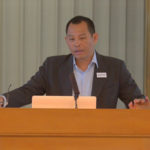 A Buddhist humanist from Burma, Maung Zarni is a member of the TRANSCEND Network for Peace Development Environment, former Visiting Lecturer with Harvard Medical School, specializing in racism and violence in Burma and Sri Lanka, and Non-resident Scholar in Genocide Studies with Documentation Center – Cambodia. Zarni s the co-founder of FORSEA, a grass-roots organization of Southeast Asian human rights defenders, coordinator for Strategic Affairs for Free Rohingya Coalition, and an adviser to the European Centre for the Study of Extremism, Cambridge. Zarni holds a PhD (U Wisconsin at Madison) and a MA (U California), and has held various teaching, research and visiting fellowships at the universities in Asia, Europe and USA including Oxford, LSE, UCL Institute of Education, National-Louis, Malaya, and Brunei. He is the recipient of the “Cultivation of Harmony” award from the Parliament of the World’s Religions (2015). His analyses have appeared in leading newspapers including the New York Times, The Guardian and the Times. Among his academic publications on Rohingya genocide are The Slow-Burning Genocide of Myanmar’s Rohingyas (Pacific Rim Law and Policy Journal), An Evolution of Rohingya Persecution in Myanmar: From Strategic Embrace to Genocide, (Middle East Institute, American University), and Myanmar’s State-directed Persecution of Rohingyas and Other Muslims (Brown World Affairs Journal). He co-authored, with Natalie Brinham, Essays on Myanmar Genocide.
A Buddhist humanist from Burma, Maung Zarni is a member of the TRANSCEND Network for Peace Development Environment, former Visiting Lecturer with Harvard Medical School, specializing in racism and violence in Burma and Sri Lanka, and Non-resident Scholar in Genocide Studies with Documentation Center – Cambodia. Zarni s the co-founder of FORSEA, a grass-roots organization of Southeast Asian human rights defenders, coordinator for Strategic Affairs for Free Rohingya Coalition, and an adviser to the European Centre for the Study of Extremism, Cambridge. Zarni holds a PhD (U Wisconsin at Madison) and a MA (U California), and has held various teaching, research and visiting fellowships at the universities in Asia, Europe and USA including Oxford, LSE, UCL Institute of Education, National-Louis, Malaya, and Brunei. He is the recipient of the “Cultivation of Harmony” award from the Parliament of the World’s Religions (2015). His analyses have appeared in leading newspapers including the New York Times, The Guardian and the Times. Among his academic publications on Rohingya genocide are The Slow-Burning Genocide of Myanmar’s Rohingyas (Pacific Rim Law and Policy Journal), An Evolution of Rohingya Persecution in Myanmar: From Strategic Embrace to Genocide, (Middle East Institute, American University), and Myanmar’s State-directed Persecution of Rohingyas and Other Muslims (Brown World Affairs Journal). He co-authored, with Natalie Brinham, Essays on Myanmar Genocide.
Tags: Asia, Aung San Suu Kyi, Bangladesh, Bhasan Char refugee camp, Buddhism, Burma, Cultural violence, Direct violence, Ethnic Cleansing, Free Rohingya Coalition, Genocide, History, Human Rights, Institute on Statelessness and Inclusion, International Court of Justice ICJ, Justice, Maung Zarni, Myanmar, Racism, Religion, Rohingya, Social justice, Structural violence, Tendayi Achiume, United Nations, Yanghee Lee
DISCLAIMER: The statements, views and opinions expressed in pieces republished here are solely those of the authors and do not necessarily represent those of TMS. In accordance with title 17 U.S.C. section 107, this material is distributed without profit to those who have expressed a prior interest in receiving the included information for research and educational purposes. TMS has no affiliation whatsoever with the originator of this article nor is TMS endorsed or sponsored by the originator. “GO TO ORIGINAL” links are provided as a convenience to our readers and allow for verification of authenticity. However, as originating pages are often updated by their originating host sites, the versions posted may not match the versions our readers view when clicking the “GO TO ORIGINAL” links. This site contains copyrighted material the use of which has not always been specifically authorized by the copyright owner. We are making such material available in our efforts to advance understanding of environmental, political, human rights, economic, democracy, scientific, and social justice issues, etc. We believe this constitutes a ‘fair use’ of any such copyrighted material as provided for in section 107 of the US Copyright Law. In accordance with Title 17 U.S.C. Section 107, the material on this site is distributed without profit to those who have expressed a prior interest in receiving the included information for research and educational purposes. For more information go to: http://www.law.cornell.edu/uscode/17/107.shtml. If you wish to use copyrighted material from this site for purposes of your own that go beyond ‘fair use’, you must obtain permission from the copyright owner.

